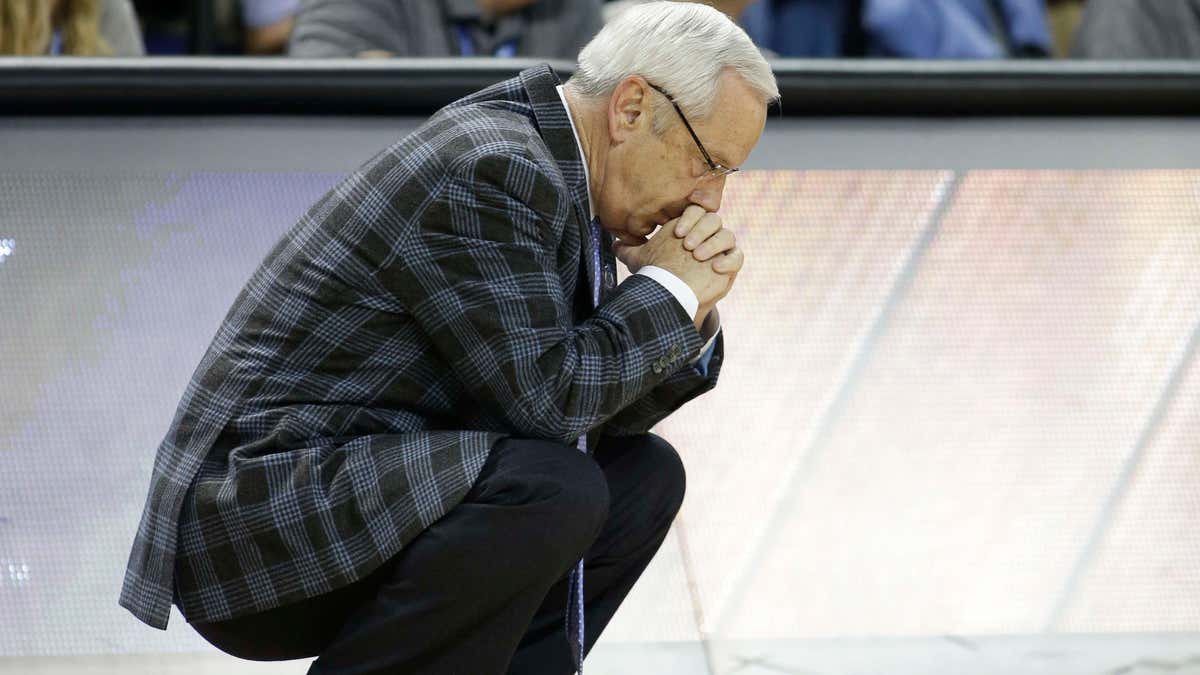
March 2015: North Carolina head coach Roy Williams bows his head during the second half of an NCAA college basketball game against Virginia in the semifinals of the Atlantic Coast Conference tournament in Greensboro, N.C. (AP)
North Carolina's long-running academic fraud scandal now includes five NCAA charges, including a lack of institutional control for poor oversight of an academic department popular with athletes and the counselors who advised them.
The school released a 59-page notice of allegations Thursday from the NCAA, which uses the document to specify violations uncovered during an investigation. The charges were more broad-based than focused on individual sports, with the NCAA regarding academic irregularities in the formerly named African and Afro-American (AFAM) Studies department as potential improper benefits by saying athletes received access to courses and other assistance generally unavailable to non-athletes.
No coaches were named in the five allegations, though one dealt specifically with the conduct of a women's basketball adviser for providing too much help on research papers.
UNC must file a response to the NCAA within 90 days of receiving the notice, which would likely lead to a hearing with the infractions committee followed by a ruling weeks to months later.
"Everybody wants to bring closure to this," athletic director Bubba Cunningham said Thursday. "It's not a pleasant chapter in the history of the university."
The list of charges include counselors providing "special arrangements" to athletes by working with AFAM faculty and staff, such as requesting course offerings or obtaining assignments for athletes, over a roughly nine-year period starting in 2002.
In charging a lack of institutional control, the NCAA said the school didn't do enough to monitor the AFAM department nor the academic support program for athletes. That allowed for counselors to use the irregular courses to help keep at-risk athletes eligible "particularly in the sports of football, men's basketball and women's basketball," according to the notice.
All five charges are considered potential Level I violations, described by the NCAA as a "severe breach of conduct." Cunningham said it's too early to speculate on potential sanctions the school could face.
"Everyone who loves Carolina is truly saddened by these allegations," Hall of Fame basketball coach Roy Williams said in a statement. "We aspire to and work toward meeting higher standards than the actions that warranted this notice. Our university and numerous outside groups have looked at every aspect of our academic and athletic life. As a result, Carolina has implemented scores of new processes and checks and balances that have undoubtedly made us a better university. Hopefully, we will never again receive such a notice."
The NCAA reopened its investigation last summer into academic misconduct, an offshoot of a 2010 investigation into the football program that led to sanctions in March 2012. The focus was courses often treated as independent studies that required no class time and one or two research papers, with many operating that way despite being scheduled as lecture classes.
An eight-month investigation conducted by former U.S. Justice Department official Kenneth Wainstein stated that office administrator Deborah Crowder — not a faculty member — typically handed out assignments then high grades after only a scan of the work.
Wainstein's October report found problems running from 1993 to 2011 and affecting more than 3,100 students, with athletes across numerous sports accounting for roughly half the enrollments in problem courses.
The five charges listed in the NCAA's notice are:
—There was a lack of institutional control in failing to "sufficiently monitor" the interactions between the AFAM and the academic support departments, noting athletes received "preferential access" to AFAM's irregular courses.
—Academic counselors "leveraged" relationships from fall 2002 to summer 2011 with AFAM faculty and staff to provide athletes with benefits such as suggesting assignments, turning in papers for them and recommending grades. In addition, 10 athletes exceeded UNC's 12-hour limit of independent study credits countable toward graduation between fall 2006 and summer 2011 due to misidentified "paper classes."
—Women's basketball counselor Jan Boxill provided improper assistance by sometimes adding content to athletes' papers and recommended a grade for submitted work in at least one case.
—Crowder, one of two AFAM staffers most directly linked to the irregularities, didn't cooperate with NCAA investigators.
—Former AFAM department chairman Julius Nyang'oro, the other staffer most directly linked to the irregular courses, also declined to cooperate.
Both Crowder, who retired in 2009, and Nyang'oro cooperated with Wainstein's probe amid the backdrop of a criminal fraud investigation. Boxill resigned in February as a philosophy professor after the school informed her it planned to fire her after the release of Wainstein's report.
The fraud case has led to several lawsuits from former UNC athletes against the school or NCAA, as well as questions from UNC's accreditation agency.
The school announced May 22 it had received the NCAA's notice, but didn't release the document publicly until Thursday to redact information to comply with privacy laws.
